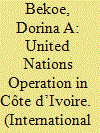|
|
|
Sort Order |
|
|
|
Items / Page
|
|
|
|
|
|
|
| Srl | Item |
| 1 |
ID:
067565


|
|
|
|
|
| Publication |
London, Lynne Rienner Publishers, 2006.
|
| Description |
164p.
|
| Series |
International Peace Academy occasional paper series
|
| Standard Number |
1588263797
|
|
|
|
|
|
|
|
|
|
|
|
Copies: C:1/I:0,R:0,Q:0
Circulation
| Accession# | Call# | Current Location | Status | Policy | Location |
| 050588 | 320.9676090511/BEK 050588 | Main | On Shelf | General | |
|
|
|
|
| 2 |
ID:
185372


|
|
|
|
|
| Summary/Abstract |
Existing electoral violence prevention programming does not sufficiently account for the incentives that compel political actors to use violence. When Nana Addo Dankwa Akufo-Addo defeated Ghana’s incumbent President, John Dramani Mahama, in December 2016, the transition was lauded for its orderliness and credited with furthering Ghana’s democratization. Many attributed the peaceful transfer of power to significant reforms undertaken by the electoral commission and the democratic values internalized by the candidates. However, we find that the reforms and personal attributes of the political actors were inadequate for resolving impasses that could have worsened the electoral environment. Our analysis reveals that interventions to prevent electoral violence must mitigate political actors’ incentives to use or tolerate violence in furtherance of their objectives. In Ghana, we find that back channel negotiations—coupled with identifying potential hotspots, early monitoring and observation, and conflict resolution mechanisms—created a robust electoral violence prevention framework that reduced tensions and produced a relatively peaceful political transition. Our findings advance existing theories and practices for preventing electoral violence, which emphasize capacity building, institutional reforms, and other technical approaches to managing elections. We conclude that directly engaging political actors is a critical component of preventing electoral violence in Africa.
|
|
|
|
|
|
|
|
|
|
|
|
|
|
|
|
| 3 |
ID:
158030


|
|
|
|
|
| Summary/Abstract |
Despite the certification of Côte d’Ivoire’s 2010 presidential elections by the United Nations Operations in Côte d’Ivoire (UNOCI), they resulted in the most violent of Sub-Saharan Africa, in the two decades since the transition to a democratic dispensation. UNOCI and Ivorian authorities embarked on a certification process in order to infuse credibility into a system and institutions divided along religious, regional, and cultural fault lines. Instead, the four months of fighting between the two main political parties nearly plunged the country back into civil war. This paper examines why certification could not provide a credible process; it considers the roles and leverage of the broader international community, to conclude that UNOCI did not have the relevant tools or capacity at its disposal, nor were there adequate incentives to resolve the factors threatening the peacefulness of elections. By prioritizing the holding of elections, without ensuring sufficient levels of peace, security, and inclusivity in Côte d’Ivoire, certification not only failed, but enabled the flourishing of an environment inimical to free, transparent, and credible elections.
|
|
|
|
|
|
|
|
|
|
|
|
|
|
|
|
|
|
|
|
|